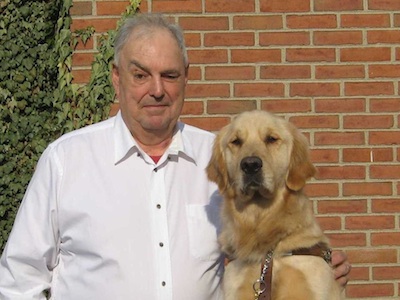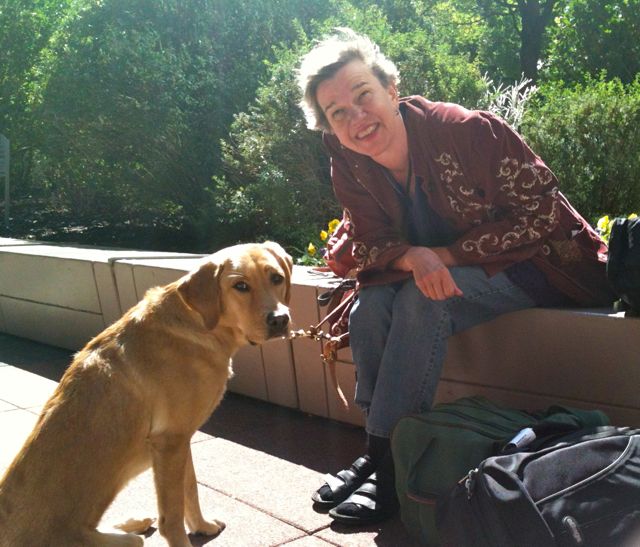Seeing Eye weathering the storm in New Jersey
November 1, 2012 • 8 Comments • Posted in blindness, Seeing Eye dogs, UncategorizedReports I’m receiving from fellow Seeing Eye graduates tell me the Seeing Eye school, located in Morristown, New Jersey, was spared some of the more devastating damage caused by Hurricane Sandy. Training at the Seeing Eye usually includes a trip to the Morristown train station to learn to get safely on and off trains with your dog, and with so many trains not running, that may be eliminated for a while. Same goes for trips to New York City for urban work.
Every day last month the Seeing Eye posted a picture on Facebook of a graduate with a short anecdote about how Seeing Eye dogs change our lives, and my friend Jerry Smith and I were two of the 31 grads featured there.
You might recognize Jerry’s name – he lives in Ontario, and I talked about him in a post I wrote last October after his Seeing Eye dog Seymour died. Seymour and my retired dog Hanni were classmates at the Seeing Eye in 2001, and Jerry and Seymour were a particularly colorful pair. Jerry returned to the Seeing Eye earlier this year and is working with his sixth guide, a Golden Retriever named Aztec, now. He was paired with his first Seeing Eye dog, a male German shepherd named Val, in 1971, and wrote about that dog for his Facebook story:
This story happened soon after I was partnered with Val. We were hurrying to a meeting in a hotel in Toronto and I was pushing my partner to go faster and faster as I was very late. We went down some stairs and down a long hall when suddenly Val stopped. I urged him on but he stopped in front of me, blocking me from going forward. I was in such a rush I made a big rookie mistake: I ignored him, stepped around him, and went forward myself. I took a couple steps before falling down an open elevator shaft. I only fell a short distance and fortunately (for me) I landed on top of two workers at the bottom. No one was injured, and I had let go of Val’s leash when I fell so he was still up there. The workers told me he was standing at the edge, looking down at me as if to say, “You have learned the first lesson – always trust your guide.
My decision 20+ years ago to train at the Seeing Eye ended up introducing me not only to four fun, fabulous furry four-legged friends, but also to dozens of spirited blind people like Jerry who come from all over North America to train with Seeing Eye dogs. We all return home to travel safely and independently with our dogs, thanks to the hard work of hundreds of generous staff members and volunteers. Most of these people live in New Jersey, and my thoughts are with them, and the dogs in the Seeing Eye kennels, and the puppies living with volunteer puppy raisers throughout New Jersey, as they all weather the storm.



